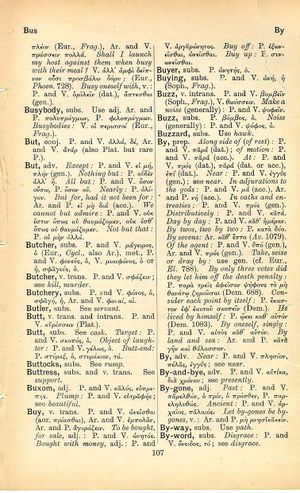but: Difference between revisions
From LSJ
λέγεις, ἃ δὲ λέγεις ἕνεκα τοῦ λαβεῖν λέγεις → you speak, but you say what you say for the sake of gain (Menander, fr. 776)
(Woodhouse 2) |
(CSV3) |
||
| Line 1: | Line 1: | ||
{{ | {{Woodhouse1 | ||
| | |Text=[[File:woodhouse_107.jpg|thumb|link={{filepath:woodhouse_107.jpg}}]]'''conj.''' | ||
P. and V. [[ἀλλά]], δέ, Ar. and V. [[ἀτάρ]] (also Plat. but rare P.). | |||
'''adv.''' | |||
<b class="b2">Except</b>: P. and V. εἰ μή, [[πλήν]] (gen.). | |||
<b class="b2">Nothing but</b>: P. οὐδὲν ἀλλʼ ἤ. | |||
<b class="b2">All but</b>: P. and V. ὅσον [[οὔπω]], P. ὅσον οὐ. | |||
<b class="b2">Nearly</b>: P. ὀλίγου. | |||
<b class="b2">But for, had it not been for</b>: Ar. and P. εἰ μὴ διά (acc.). | |||
<b class="b2">We cannot but admire</b>: P. and V. οὐκ ἔστιν [[ὅπως]] οὐ θαυμάζομεν, οὐκ ἔσθʼ [[ὅπως]] οὐ θαυμάζομεν. | |||
<b class="b2">Not but that</b>: P. οὐ μὴν [[ἀλλά]]. | |||
}} | }} | ||
Revision as of 09:24, 21 July 2017
English > Greek (Woodhouse)
conj.
P. and V. ἀλλά, δέ, Ar. and V. ἀτάρ (also Plat. but rare P.).
adv.
Except: P. and V. εἰ μή, πλήν (gen.).
Nothing but: P. οὐδὲν ἀλλʼ ἤ.
All but: P. and V. ὅσον οὔπω, P. ὅσον οὐ.
Nearly: P. ὀλίγου.
But for, had it not been for: Ar. and P. εἰ μὴ διά (acc.).
We cannot but admire: P. and V. οὐκ ἔστιν ὅπως οὐ θαυμάζομεν, οὐκ ἔσθʼ ὅπως οὐ θαυμάζομεν.
Not but that: P. οὐ μὴν ἀλλά.

